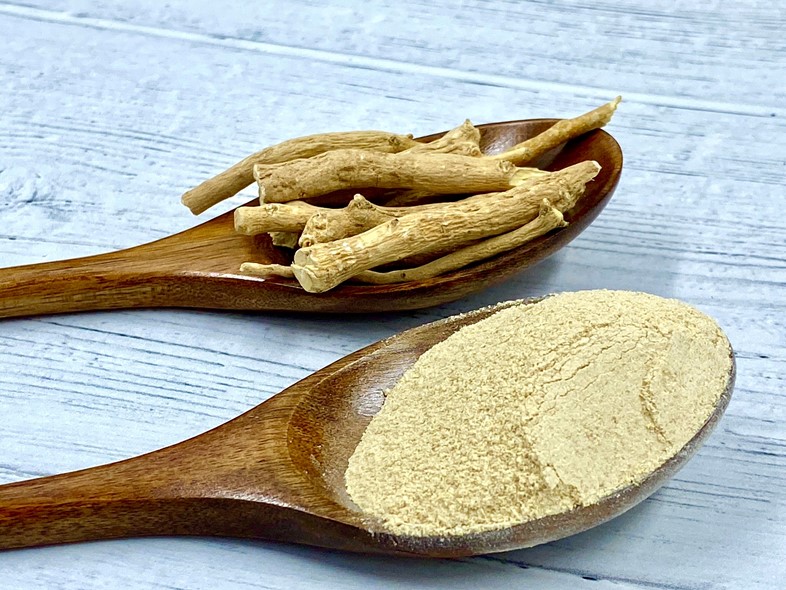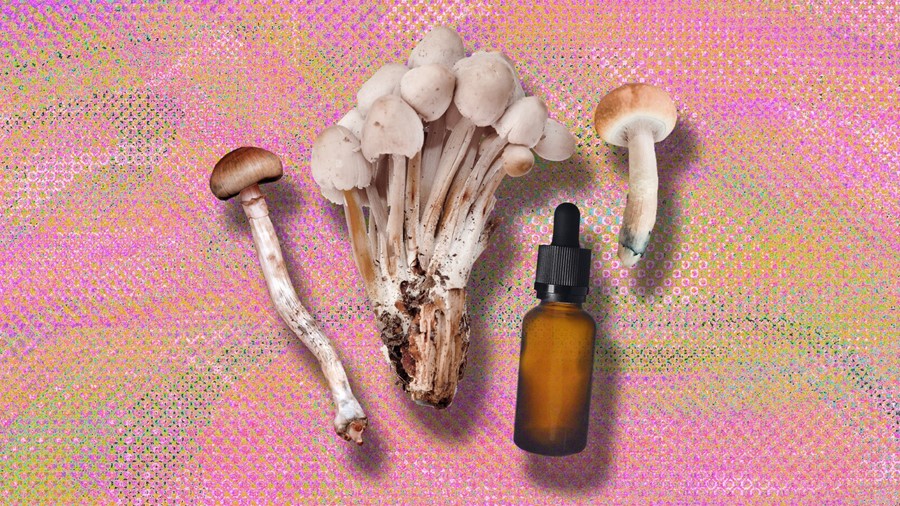Adaptogens including ashwagandha and lion’s mane mushroom are the latest viral wellness supplements circulating on TikTok – but do they actually work?
I didn’t always have a groggy, low-energy personality. I used to hold down multiple jobs, run regular half-marathons and rave until the club lights came on. My problems started with sleep deprivation, missing full nights’ sleep for three years after having my daughter. Even after I (and she) started sleeping normally, my energy didn’t return. I read Maisie Hill’s insightful book about health and the menstrual cycle, Period Power, then diagnosed myself with adrenal fatigue – a condition brought on by prolonged periods of stress, leaving you constantly exhausted regardless of rest.
Adrenal fatigue is not recognised in Western medicine – it’s “not an official medical diagnosis” according to Dr Federica Amati PhD, an AfN accredited nutritionist and public health scientist I spoke to – but its symptoms describe my life to a T. My main concerns are fatigue, the ability to sleep forever (given the chance) and a general feeling of overwhelm. It’s doubting my ability to get stuff done, then proving myself right. Multiple blood tests revealed no medical explanation for my constant exhaustion. However, via my work as a journalist, I got to try out some cool alternative treatments, including the viral superfood of the moment, adaptogens.
Adaptogens are “a class of herbs that, very simply, help our bodies and minds adapt to stress”, according to Dr Heather Robinson, ND Naturopathic Doctor of the London Clinic of Nutrition. She explains that each herb interacts slightly differently with our systems, with different effects. “Some work on changing what cortisol, our primary ‘stress hormone’ released from our adrenals, does,” she says. “It’s necessary to function and feel energised and motivated, but like everything, has to be in balance” Licorice root, for example, “increases how long cortisol remains in the blood,” while ashwagandha “has a more cortisol lowering effect.”
Other adaptogens work on modifying neurotransmitter activity, sometimes via the brain and sometimes the nervous system itself. “Some adaptogens fight inflammation which has a very close relationship with cortisol. Turmeric is known as a potent anti-inflammatory, but it’s also technically an adaptogen.” Functional mushrooms, meanwhile, like Cordyceps and Reishi, support the immune system by supporting white blood cell production.
Thanks to wellness culture and TikTok, where #ashwagandha has almost 400 million views, adaptogens are trending heavily right now – but they have been used in Ayurvedic and Chinese medicine for centuries. Although not all trending natural remedies are recommended or even acknowledged by western medicine, adaptogens do have a base in evidence. A 2010 study found that “a number of clinical trials demonstrate that adaptogens exert an anti-fatigue effect that increases mental work capacity against a background of stress and fatigue, particularly in tolerance to mental exhaustion and enhanced attention.”
Dr Amati, who is also chief scientist for Never Go Alone alongside her work as a postdoctoral medical scientist and nutritionist, says in some cases she advises clients to incorporate adaptogens like ashwagandha and functional mushrooms because of the “exciting preliminary data for improved health outcomes” in recent studies. “They have powerful natural compounds which can help reduce oxidative stress and so have a big impact at cellular level to mitigate the negative effects of stress.”
Since meeting herbalist Natasha Richardson a few months ago, I’ve been drinking ashwagandha in my morning cuppa, a ritual that actually makes me want to get out of bed to have it. Rested Resilience from Forage Botanicals, Richardson’s herbal remedy brand, also contains oat tops and hawthorn to regulate blood pressure and comes in the form of a chai latte powder which I mix with hot oat milk and add to rooibos. It’s hard to describe the subtle improvements from drinking it – it takes the edge off the doom and dread I feel on waking, resulting in a more balanced mood. (Exactly the effect I was hoping for while dosing myself with drops of CBD oil through the most stressful parts of lockdown, with zero noticeable results).
Ashwagandha originates from the root of a shrub native to India and the Middle East and has long been used in Ayurvedic medicine for anxiety and depression. It works, according to Dr Robinson, by “modifying neurotransmitter activity.” Neurotransmitters are little chemical messengers that regulate things like serotonin, dopamine and GABA which affect mood. “They play a role in how we feel, our sense of reward, motivation, memory and anxiety,” she explains. Ashwagandha also lowers cortisol, the ‘stress’ hormone.

The next adaptogen on the list was mushroom tea (non-psychedelic) which I tried at the launch of a new brand of mushroom-influenced skincare, Herbar. After dinner, I felt energised enough to walk part of the way home, then lay awake, thinking about things in bed. In the morning I woke pre-alarm and got straight up, without scrolling and pretending the day wasn’t happening. I wanted to start work as soon as possible so got my laptop and started smashing out my to-do list. Around midday the following day, my focus faded and I went back to my normal spaced-out self.
Having quit caffeine during my sleepless period in order to nap or have an early night, I sometimes struggle to concentrate. Reintroducing caffeine made me anxious, so I now go without it. I love my deep sleeps, but miss caffeine’s power to mentally get me in the zone so I was overjoyed to discover mushroom tea adds mental sharpness. The energy boost doesn’t result in the same crash, or wired, anxious feeling I get from coffee and tea. “It works on the brain and nervous system itself,” Dr Robinson explains. “Lion’s mane contributes to the release of Nerve Growth Factor, helping with memory, attention and even recovery from physical stressors like concussions.” It’s no wonder online reviews have shown its popularity with the ADHD community to complete their tasks.
Another key difference between caffeine and adaptogens is that adaptogens help your body build resilience over time so you won’t become dependent on them. “The goal with herbal medicine is to support re-establishing the body’s harmony and homeostasis,” says Dr Robinson. “This means that the herb(s) are doing some heavy lifting at the beginning, but over time is supporting your body’s ability to do that on its own.” She recommends taking supplements for a minimum of six weeks, or more usefully, three months then assessing results, although cautions that each person’s needs are vastly different.
If you’re wondering about sampling these herbs, Dr Robinson says dosing makes a big difference. “There are a lot of wonderful powders and elixirs on the market, if you’re looking for a little additional support,” she says. However, “if you’re in need of more powerful herbs because you’re really struggling to cope with stress, fatigue, brain fog, the powders and elixirs may not cut it as the dose is just too low.” If that is the case, lifestyle changes as well as a visit to a professional could be in order.
Dr Amati also stresses the importance of looking at your diet and lifestyle as a whole, rather than relying on adaptogens as a “magic bullet”, explaining that exhaustion, stress and less nutritious diets are often connected. “I do come across clients who suffer from the impacts of stress and low energy, as so many of us struggle to balance busy work, family and social lives,” she says. “Food is often overlooked first, when it is the fuel that we all need for good mental and physical health.”
She recommends “adding more helpful foods with whole plant products such as Indi supplements and phyto nectars to increase the diversity of plants and beneficial plant chemicals in our diets”, as well as remembering that “good sleep, moving outdoors every day, connecting with friends and family and maintaining a good level of hygiene throughout our busy days” all contribute to feeling healthier and stronger.
Be aware if you’re on any medications (contraceptive pill included), that there may be interactions between herbs and the efficacy of your medication. Double check with a practitioner that it’s safe for you.




